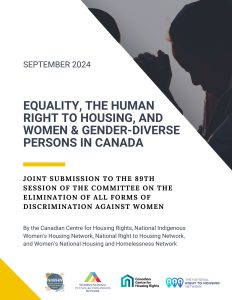Background
In October of 2024, the United Nations Committee on the Elimination of Discrimination against Women will convene for its 89th session. The Committee is the body of independent experts that monitors implementation of the Convention on the Elimination of All Forms of Discrimination against Women (CEDAW). Canada signed on to (i.e., ratified) CEDAW in 1981.
In 2016, the CEDAW Committee told Canada to:
“ensure that the national poverty reduction strategy and the national housing strategy protect the rights of all women, with a focus on the most disadvantaged and vulnerable groups, by integrating a human rights-based and gender-based approach.”
Our Joint Submission
Women and gender-diverse people, and particularly Indigenous women, girls, Two-Spirit, and gender-diverse people, are experiencing some of the most egregious right to housing violations across Canada.
In our joint submission to the 89th session of CEDAW Committee, we outline the state of the housing and homelessness crisis as experienced by women and gender-diverse persons in Canada, and offer recommendations on how to address:
- The lack of coordinated action to improve the socio-economic conditions of women and gender-diverse persons (i.e., poverty, access to education, access to healthcare etc.) that impact housing security;
- The rampant human rights violations faced by Indigenous women, girls, Two-Spirit, and gender-diverse people that contribute to inadequate housing and homelessness;
- The need for federal housing programs and funding that are Indigenous-led and gender-responsive;
- The lack of adequate income supports for women and gender-diverse people and their families.
This submission was created jointly by the Canadian Centre for Housing Rights, National Indigenous Women’s Housing Network, National right to Housing Network, and Women’s National Housing and Homelessness Network.


